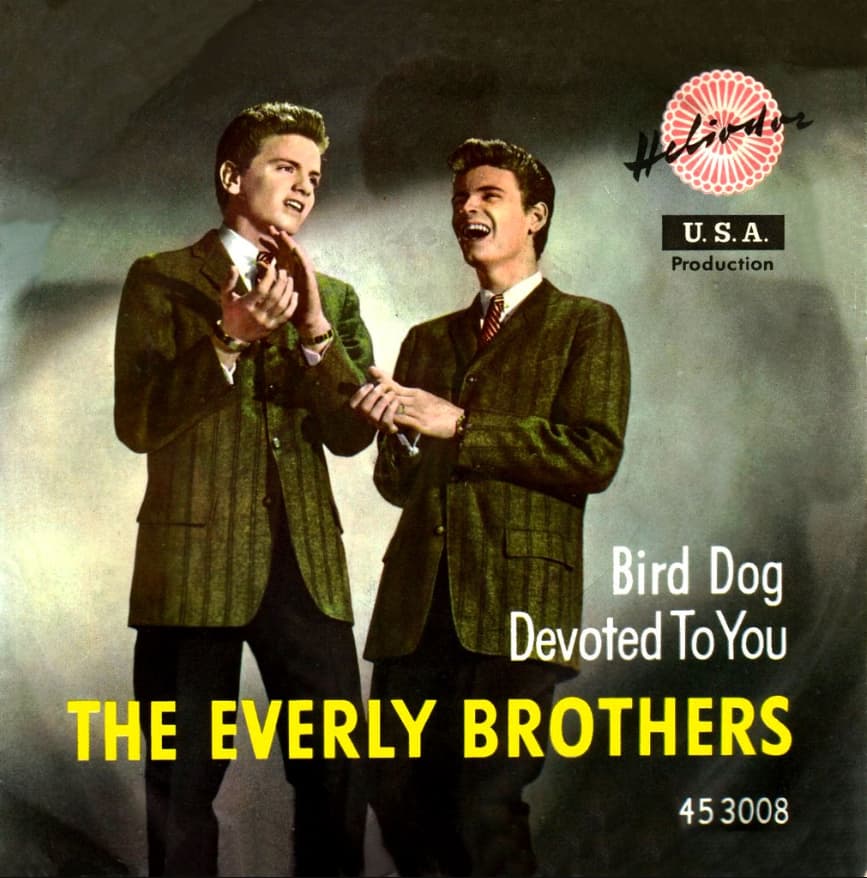
“Bird Dog”: A Humorous Look at Unrequited Love and Rivalry
The Witty Tale of a Fella’s Troubles with a “Bird Dog”
For many of us who came of age with the dawn of rock and roll, the names Don and Phil Everly are etched into our memories with the kind of clarity reserved for the most cherished moments. Their signature blend of close harmonies and acoustic-driven melodies provided the soundtrack to countless first dances and late-night drives. In the summer of 1958, as the world was still buzzing with the raw energy of Elvis and the early stirrings of doo-wop, the Everly Brothers offered something different—something delightfully wry and utterly relatable. Their hit single “Bird Dog” captured the whimsical frustration of a love triangle with a playful twist, becoming a cornerstone of their early career and a testament to their unique appeal.
Released as a single on the Cadence Records label, “Bird Dog” quickly soared up the charts, landing at number one on the U.S. Country & Western and U.S. Cash Box Top 100 charts. It also performed exceptionally well internationally, reaching number two on the Billboard Hot 100 and number two in the UK Singles Chart. The song’s success was a powerful follow-up to their earlier smash hits like “Bye Bye Love” and “Wake Up Little Susie,” solidifying their status as one of the most bankable acts of the era.
The genius of “Bird Dog” lies not just in its catchy melody, but in its clever use of a simple metaphor. The term “bird dog” here isn’t about a hunting companion; it’s a playful, slightly derogatory nickname for a persistent rival. The song’s narrator, a lovesick young man, laments the relentless pursuit of his girl by a certain “bird dog,” who seems to be “everywhere she goes.” It’s a feeling many of us can recall: the frustration of having your romantic territory constantly invaded by a competitor who just won’t give up. The lyrics, penned by the legendary songwriter Boudleaux Bryant, are filled with charmingly simple yet evocative imagery, painting a picture of a guy who’s at his wit’s end. . He’s a “no good bird dog,” a “low down scoundrel,” and a “mean old sneak” who’s always “circling around” his girl. The humor is subtle but pervasive, especially in the final verses where the narrator’s desperation peaks, and he finds a comical resolution.
While the song’s tone is lighthearted, its story speaks to a universal experience. It’s a musical slice-of-life that captures the innocence and angst of teenage romance in the 1950s. The Everly Brothers’ performance is what truly brings the narrative to life. Their impeccable harmonies, with Don’s deeper vocal providing a sturdy foundation for Phil’s soaring falsetto, make the tale of romantic woe sound almost effortless. The acoustic guitar rhythm, a hallmark of their sound, gives the song a folksy, relatable feel, a warm contrast to the more electric and rebellious sounds of their contemporaries. As we listen to “Bird Dog” today, it’s more than just a song; it’s a time machine back to a simpler time, a memory of a record spinning on a jukebox or a melody wafting from a car radio on a summer’s day, reminding us that even the most frustrating parts of young love can be looked back on with a chuckle and a sense of wistful fondness. It’s a perfect example of why the Everly Brothers were, and remain, so beloved: they had an uncanny ability to turn everyday emotions into timeless art.